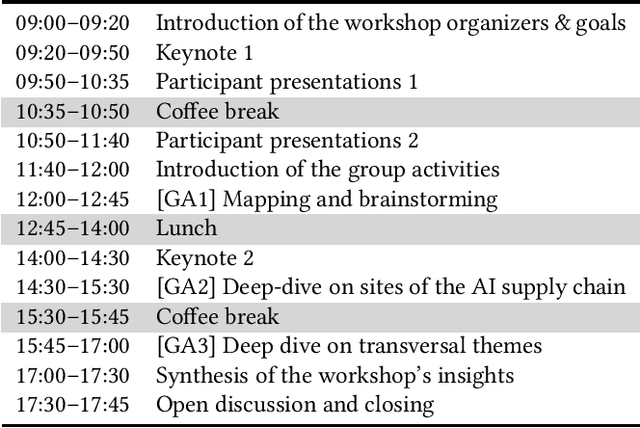Kars Alfrink
Towards Meaningful Transparency in Civic AI Systems
Oct 09, 2025Abstract:Artificial intelligence has become a part of the provision of governmental services, from making decisions about benefits to issuing fines for parking violations. However, AI systems rarely live up to the promise of neutral optimisation, creating biased or incorrect outputs and reducing the agency of both citizens and civic workers to shape the way decisions are made. Transparency is a principle that can both help subjects understand decisions made about them and shape the processes behind those decisions. However, transparency as practiced around AI systems tends to focus on the production of technical objects that represent algorithmic aspects of decision making. These are often difficult for publics to understand, do not connect to potential for action, and do not give insight into the wider socio-material context of decision making. In this paper, we build on existing approaches that take a human-centric view on AI transparency, combined with a socio-technical systems view, to develop the concept of meaningful transparency for civic AI systems: transparencies that allow publics to engage with AI systems that affect their lives, connecting understanding with potential for action.
From Stem to Stern: Contestability Along AI Value Chains
Aug 02, 2024
Abstract:This workshop will grow and consolidate a community of interdisciplinary CSCW researchers focusing on the topic of contestable AI. As an outcome of the workshop, we will synthesize the most pressing opportunities and challenges for contestability along AI value chains in the form of a research roadmap. This roadmap will help shape and inspire imminent work in this field. Considering the length and depth of AI value chains, it will especially spur discussions around the contestability of AI systems along various sites of such chains. The workshop will serve as a platform for dialogue and demonstrations of concrete, successful, and unsuccessful examples of AI systems that (could or should) have been contested, to identify requirements, obstacles, and opportunities for designing and deploying contestable AI in various contexts. This will be held primarily as an in-person workshop, with some hybrid accommodation. The day will consist of individual presentations and group activities to stimulate ideation and inspire broad reflections on the field of contestable AI. Our aim is to facilitate interdisciplinary dialogue by bringing together researchers, practitioners, and stakeholders to foster the design and deployment of contestable AI.
Contestable Camera Cars: A Speculative Design Exploration of Public AI That Is Open and Responsive to Dispute
Feb 09, 2023Abstract:Local governments increasingly use artificial intelligence (AI) for automated decision-making. Contestability, making systems responsive to dispute, is a way to ensure they respect human rights to autonomy and dignity. We investigate the design of public urban AI systems for contestability through the example of camera cars: human-driven vehicles equipped with image sensors. Applying a provisional framework for contestable AI, we use speculative design to create a concept video of a contestable camera car. Using this concept video, we then conduct semi-structured interviews with 17 civil servants who work with AI employed by a large northwestern European city. The resulting data is analyzed using reflexive thematic analysis to identify the main challenges facing the implementation of contestability in public AI. We describe how civic participation faces issues of representation, public AI systems should integrate with existing democratic practices, and cities must expand capacities for responsible AI development and operation.
 Add to Chrome
Add to Chrome Add to Firefox
Add to Firefox Add to Edge
Add to Edge